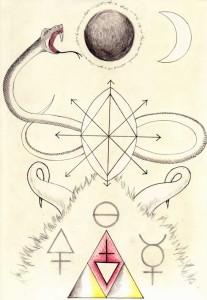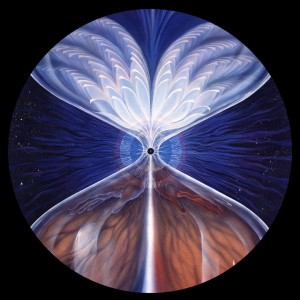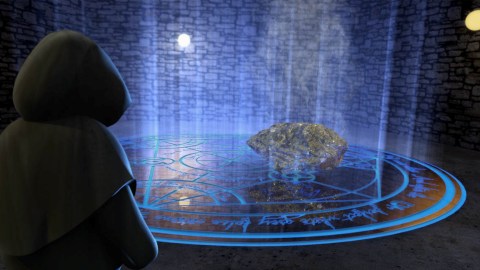From inside, the day is uniformly gray and dreary, as another in a long series of storms off the Pacific discharges rain and wind in northern California. But on the patio, after a few minutes of passive observation, one notices a variation from east to west in the skies.
 It’s between squalls and lightly raining, though the winds are occasionally gusting. Traffic noise from the freeway is intermittent. To the west, the sky is dark, even ominous-looking. To the east it is brighter, although still solidly gray.
It’s between squalls and lightly raining, though the winds are occasionally gusting. Traffic noise from the freeway is intermittent. To the west, the sky is dark, even ominous-looking. To the east it is brighter, although still solidly gray.
Suddenly things reverse, and the sky turns white to the west–a florescent white that makes the dark, leafless branches of the trees next door stand out with otherworldly vividness.
One feels a palpable sense of mystery and reverence. It’s sunset, and the whiteness grows so bright that for a moment I think the clouds are about to burn off and the sky turn blue.
Instead the wind ceases, and the ethereal light grows even more intense. The mind falls silent. Within a couple minutes the light is gone and the skies return to a uniformly dull gray. But now nothing is familiar, and at some inexpressible level, one feels changed.
It is easy to be overwhelmed by the scale of the challenges facing humankind, and to conclude, “I can only think of myself.” Even so, why are so many people taking this attitude? It represents an even greater threat to the human prospect than the ecological crisis, economic inequity, and political chaos facing the global society.
People who say, “I can only think of myself” are not only inwardly and intellectually beleaguered, they have quit on humankind. They may see or feel the world as it is, but they just don’t see and feel any other way, or any chance that things can change.
Though they may be right in the present age, a personal orientation flows from and feeds into the very momentum of darkness that is overwhelming all of us. In point of fact, there is no world separate from you and I.
So when one says, “I can only think of myself,” it signifies not just a giving up on humanity, but also a giving up on oneself. No person is separate from humanity, but each of us is a microcosm of humankind.
More and more people feel that a radical change in human consciousness is essential. But discussions about a revolution  in consciousness can and often do degenerate into vague, New Age verbiage.
in consciousness can and often do degenerate into vague, New Age verbiage.
Despite what the media mouthpieces say, it’s essential to see that consciousness does not ‘evolve,’ it just accretes. Therefore it’s absurd to talk about “the next logical step in our trajectory as a species,” because human consciousness in recent decades has been rapidly devolving, with many people aspiring to think and feel no higher than their pets.
So what would a revolution in consciousness look like?
Living alongside the Neanderthals in the shadow of 3000-meter high glaciers, ‘modern humans’ exploded onto the scene about 40,000 years ago. Representational and abstract art, music, and diverse technologies and cultures emerged suddenly, in the most forbidding places, not just in Europe but all over the world.
So the human mind–consciousness as we know it–did not evolve in the sense of gradually appearing and becoming refined over time, but rather emerged full-blown. That consciousness has come to an end.
Despite desperate attempts by media mouthpieces to sustain the illusion of human progress, no serious person believes in an ascending curve of human civilization anymore. Indeed, nearing the saturation point of the accretion of the past, human consciousness in recent decades has been rapidly deteriorating.
If and when it does occur, the next revolution in consciousness will explode onto the scene like the last one, 40,000 years ago, only consciously rather than subconsciously. Homo symbolicus will give way Homo spiritus. But that has not  occurred and there is no sign of it occurring at this time, despite or because of all the New Age blather about it.
occurred and there is no sign of it occurring at this time, despite or because of all the New Age blather about it.
The human brain has the capacity to transcend its ancient enslavement to symbols, tradition and conditioning, and be anchored in attention, direct perception, and insight. Awakening such a timeless state for even a short period every day is difficult and rare enough, and illumined human beings are exceedingly rare. Speaking for myself, it usually only happens during meditation.
Consciousness as we usually know it is essentially perception mediated by symbols, memories, and associations. When the brain is no longer engaged in the chatter of self-centered activity, but awakens the unforced stillness of attention, the human mind has a completely different quality of consciousness.
The self-made fragmentation of the earth, culture, and the individual is putting tremendous pressure on humankind to radically change. Most people aren’t accepting the challenge and responsibility however, but quitting, consciously or subconsciously, on humanity and themselves, turning to strictly personal pursuits. Hence the exponential rise in narcissism.
On the other hand, a growing minority may be responding by questioning and observing human consciousness within, thereby transforming themselves and potentially human consciousness as a whole.
As the ‘Arab Spring’ attests, there won’t be any more significant political advances without a revolution in consciousness that transforms so-called human nature. The unaddressed dark side of man has overwhelmed the historical process, for whatever it was worth, and the speed of superficial scientific, technological, and social change substitutes for real change.
A revolution in consciousness will not be another change in the social and political order, much less some feel-good idea of oneness, but a consciously and arduously achieved transmutation in the human brain brought about by the undivided individual.
That’s why meditation, by whatever name, is so important. Whether a temporary or irrevocable state, the unconditioned mind sees things directly, without the mediation of symbols, associations, traditions, and beliefs (that is, the past).
This process of transmutation allows insight to flourish in the brain, holding the potential of not only ending humankind’s downward spiral, but bringing about a new species. It may not happen in our lifetimes, but that is what the human being works for.
Martin LeFevre

